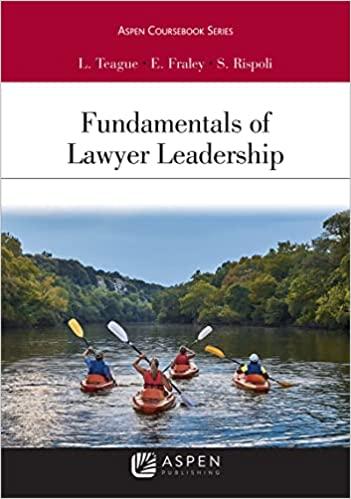Question
PART I Question1 Explain the relations between the sovereignty of a state and the jurisdiction of a state in international law. Question 2 Explain the
PART I
Question1
Explain the relations between the sovereignty of a state and the jurisdiction of a state in international law.
Question 2
Explain the concept of universal jurisdiction in international law, including its rational, scope for application, and limitations.
Question 3
In 1993, the Belgian Parliament voted a 'law of universal jurisdiction' to allow it to judge people accused of war crimes, crimes against humanity or genocide. In 2000, Belgium issued and circulated internationally an arrest warrant under this law against Abdoulaye Yerodia Ndombasi, then Minister of Foreign Affairs of the Democratic Republic of the Congo, who according to Belgium committed grave breaches of the Geneva Convention of 1949 and of the Additional Protocols thereto and crimes against humanities.
Congo (a former Belgium colony between 1908 and 1960) filed a case to the International Court of Justice (ICJ), contending that Belgium violated, inter alia, 'the diplomatic immunity of the Minister for Foreign Affairs of a sovereign State ... following from Article 41, paragraph 2, of the Vienna Convention of 18 April 1961 on Diplomatic Relations' (ICJ judgement 14 Feb 2002, para 1).
the International Court of Justice found that the rules on immunity of high government
officials prevent other states from prosecuting such officials for violations of ius cogens norms.
Nevertheless, the Court also held that immunity from jurisdiction does not necessarily mean
impunity for crimes committed. How might a person entitled to immunity under international law
nevertheless be prosecuted for crimes committed, according to the International Court of Justice?
the International Court of Justice found that the rules on immunity of high government
officials prevent other states from prosecuting such officials for violations of ius cogens norms.
Nevertheless, the Court also held that immunity from jurisdiction does not necessarily mean
impunity for crimes committed. How might a person entitled to immunity under international law
nevertheless be prosecuted for crimes committed, according to the International Court of Justice?
The ICJ found that in favour of Congo. However, the ICJ also noted that immunity from jurisdiction does not necessarily mean impunity from crimes committed. According to the ICJ, under what circumstances might a person entitled to diplomatic immunity under international law be prosecuted for crimes committed?
PART II:
Nigel Noti is an Australian national who came to live in Vanuatu. After completing his law degree, he obtained employment in a law firm in Port Vila. Before too long he was in trouble with the police. In 1998 the police arrested and charged him with having sexual intercourse with a 13 year old girl.
Section 97 of the Penal Code of Vanuatu provides as follows:
97. Unlawful sexual intercourse
(1) No person shall have sexual intercourse with any girl under the age of 13 years. Penalty: Imprisonment for 14 years.
(2) No person shall have sexual intercourse with any girl under the age of 15 years but of or over the age of 13 years. Penalty: Imprisonment for 5 years.
(3) It is no defence to a charge under this section that the girl consented or that the person charged believed that she was of or over the age in question.
Following some preliminary hearings, the criminal proceedings were abandoned after Nigel came to a settlement with the girl's family, and the girl declined to cooperate further with the prosecuting authorities.
In 2002 Nigel returned to Australia to work. However, after a few years he became the subject of police investigation there as well. Part IIIA of the Australian Crimes Act 1914 ("Child Sex Tourism") provides as follows:
50AD. Who can be prosecuted for an offence committed overseas
A person must not be charged with an offence against this Part that the person allegedly committed outside Australia unless, at the time of the offence, the person was: (a) an Australian citizen; or (b) a resident of Australia.
50BA. Sexual intercourse with child under 16
A person must not, while outside Australia, engage in sexual intercourse with a person who is under 16. Penalty: Imprisonment for 17 years.
Nigel moved to Papua New Guinea in 2007 to escape the attention of the Australian authorities, and then moved again to Solomon Islands in 2008, where he had influential friends in government. He now lives in Honiara and works in the government sector. He is still wanted by Australian police in respect of alleged offences under Part IIIA of the Crimes Act 1914. Australia has sought Nigel's extradition, but the Solomon Islands government has refused to cooperate. In Papua New Guinea and Solomon Islands there is no law equivalent to Part IIIA of the Crimes Act 1914.
* * *
Answer the following questions.
1. Which States have jurisdiction under international law to prescribe laws regulating Nigel's conduct, and on what basis?
(a) Vanuatu
(b) Australia
(c) Papua New Guinea
(d) Solomon Islands.
2. Would you answers to Question 1(a)-(d) differ if Nigel had been a citizen of the Solomon Islands instead of Australia but had status as a permanent resident of Australia? If so, how?
3. Which States have jurisdiction under international law to arrest Nigel, and at what times?
(a) Vanuatu
(b) Australia
(c) Papua New Guinea
(d) Solomon Islands
4. Australian police are currently stationed in Solomon Islands pursuant to the multilateral treaty establishing the Regional Assistance Mission Solomon Islands (RAMSI). If Australian police abducted Nigel in Honiara and brought him to Australia to face trial, what relevance would the abduction have in criminal proceedings against Nigel in Australian courts?
Step by Step Solution
There are 3 Steps involved in it
Step: 1

Get Instant Access to Expert-Tailored Solutions
See step-by-step solutions with expert insights and AI powered tools for academic success
Step: 2

Step: 3

Ace Your Homework with AI
Get the answers you need in no time with our AI-driven, step-by-step assistance
Get Started


